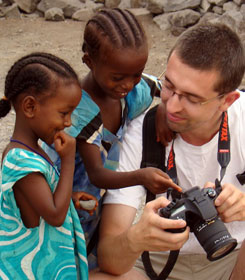
Often times I walk into my kitchen and I am both amazed and horrified at the pile of dishes that have accumulated in my kitchen sink. How can a single man, living alone, accumulate so much filth over the course of just one day? Then I think back to my day of eating when several times I made small contributions to the pile. Each plate or fork seems insignificant, but eventually contributes to something overwhelming. In an odd way, tourism and the environment work in the same way. It is easy to minimize your own actions by the logic that one person cannot have to big an impact on the environment. But we are contributors, and every time we do something leaving an aversive impact, we are piling on in the same way we pile up dishes in the sink. It is important we take ownership and appreciate the impact that we have on the environment. Furthermore, we must understand the principle of bandwagoning. Bandwagoning is the tendency of people to fall inline with what they believe others are doing. This is powerful when it coms to tourism. When you act as a responsible traveler, you are not only doing your part in maintaining environments, but you influence others to do the same. It is for this reason that we must understand how to be a responsible tourist, and how to influence others to do the same.
The first step towards this goal is to learn how to be a responsible traveler; the second is to learn to spread the word. A great way to achieve this is to take part in the Green Hotels and Responsible Tourism Initiative. This initiative involves educating people on the components of responsible tourism and sharing the information with others. The first step is to read through the Responsible Travelers Guide, a comprehensive breakdown on the effects of tourism and how we can best influence the environment. The second step is to share the information. This is the real power of this simple initiative. By sharing the information with friends, family, and fellow travelers, we can create a cascading effect that could potentially reach thousands. They promote the use of social media (Facebook, Twitter, etc) for spreading the initiative. Travelers can be most effective by sharing the initiative where they post pictures, and stories about travel experiences. Be proactive and tag friends you met during your travels, and encourage them to pass it along. You want to convey to others that caring for the places you traveled enriched your experience, and is something they should consider as well.
The tips learned in the Responsible Traveler Guide are important for all travel destinations, but can be particularly beneficial in fragile locations like Nepal. As the number of tourists visiting Nepal continues to rise, it is imperative travelers become informed on the impact of their visit. Use the Guide to ensure your impact is positive, and be vocal in sharing it with others. By taking part in this initiative, your efforts to be a responsible traveler can reach thousands and make a significant impact on the environment.
The first step towards this goal is to learn how to be a responsible traveler; the second is to learn to spread the word. A great way to achieve this is to take part in the Green Hotels and Responsible Tourism Initiative. This initiative involves educating people on the components of responsible tourism and sharing the information with others. The first step is to read through the Responsible Travelers Guide, a comprehensive breakdown on the effects of tourism and how we can best influence the environment. The second step is to share the information. This is the real power of this simple initiative. By sharing the information with friends, family, and fellow travelers, we can create a cascading effect that could potentially reach thousands. They promote the use of social media (Facebook, Twitter, etc) for spreading the initiative. Travelers can be most effective by sharing the initiative where they post pictures, and stories about travel experiences. Be proactive and tag friends you met during your travels, and encourage them to pass it along. You want to convey to others that caring for the places you traveled enriched your experience, and is something they should consider as well.
The tips learned in the Responsible Traveler Guide are important for all travel destinations, but can be particularly beneficial in fragile locations like Nepal. As the number of tourists visiting Nepal continues to rise, it is imperative travelers become informed on the impact of their visit. Use the Guide to ensure your impact is positive, and be vocal in sharing it with others. By taking part in this initiative, your efforts to be a responsible traveler can reach thousands and make a significant impact on the environment.

 RSS Feed
RSS Feed